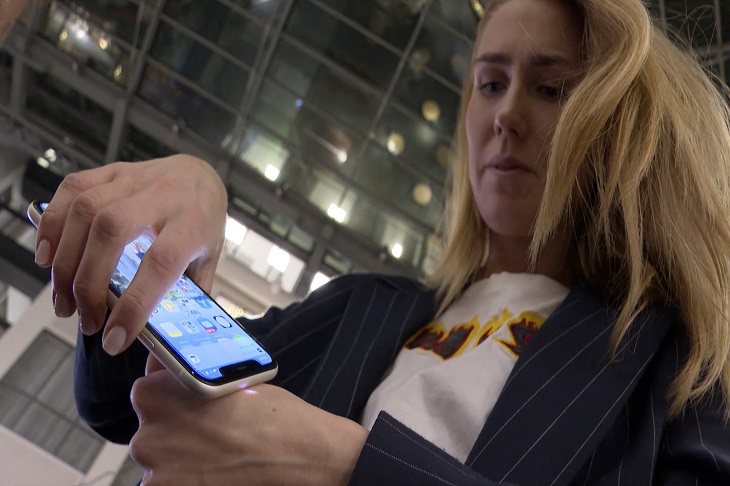Swedish startup Epicenter has created a microchip to store Covid vaccine passports. The device is inserted under the skin on your forearm and read by the same technology as contactless payments.
Hear that? It’s the clamour of so-called conspiracy theorists smashing their keyboards and shouting ‘I was right!’ at the internet.
The inevitable marriage between vaccine passports and the holy grail of technology – human microchips – has arrived at the altar and there’s no one willing to stand up and object. Whether tyranny is imitating conspiracy, or the Swedes are simply attracted to digital slavery, humanity may be microchipped like pets in the immediate future.
We know what the public used to think about this sort of idea – madness. That’s why it was dismissed as conspiracy when social media sounded the alarm twelve months ago. Who would line up to get a chip in their arm that denies them access to civilisation? Pre-2018, the answer was no one.
In 2022, there will be millions of hypochondriacs desperate to put Big Brother under their skin in the ultimate act of virtue signalling. We have a name for this – ‘transhumanism’ – where technology permanently alters humanity. This is not to be confused with artificial devices used for medical procedures. These are passive tools that do not interact with the social, political, or legal framework of a citizen and their society.
Transhumanism started as the desire to cheat mortality by augmenting with technology. It centred around the artificial extension of life and its accompanying philosophical argument about when and if we cease to be human. Others wanted to skip ahead of evolution by expanding the limitations of the body.
This grand debate has been reduced to a petty game of ‘control’ by the world’s suffocating bureaucracies. Instead of chasing godlike immortality, transhumanist technology has devolved our humanity into slavish adherence to government systems. How ironic that the first mass implementation of transhumanism is to be in the interest of limiting, rather than advancing, our species.
Österland began experimenting with microchips in 2013 when he modified implants to pair with his Samsung 5. After a few attempts, he managed to make the chip inside his arm call his wife when the phone was picked up. This success led him to contact Hannes Sjöblad from the Transhumanist community in Sweden, who then invited him to hold a demonstration at Epicenter.
The pair implanted microchips over ‘chips and beer’ evenings where Österland described the microchips as ‘cyborg applications’. This all sounds like fun – and that is often what technology is like in the experimental stage. The worries come later when government knocks on the door of ‘science’.
As was correctly pointed out at the time, there is a world of difference between tech enthusiasts exploring voluntary biological integration with wearable tech, and the power imbalance of an employer microchipping factory staff by force. ‘Are you a person being paid for your work, or are you the property of the company you work for?’ asked Urs Gasser, the Executive Director of the Berkman Klein Center for Internet and Society.
The situation facing us in 2022 is far worse than the factory scenario. The government is not proposing to be our employer, it wants to be our master.
In Epicenter’s recently aired microchip vaccine passport commercial, Hannes Sjöblad – who is now the company’s Chief Distribution Officer – waves his smartphone over his arm and it brings up his vaccination status.
Why get a microchip embedded for a ‘temporary’ pandemic set to end in 2022? Surgery seems an extreme step up from carrying around a green tick on your phone – no? These questions have an obvious answer…
The Australian Federal Health Minister Greg Hunt has ordered in excess of a hundred million doses of Covid vaccines with boosters to be administered to the double-jabbed at the three-month mark, meanwhile Australian states have built quarantine camps instead of hospitals. These actions suggest this situation is permanent – a ‘new normal’.
‘In case your phone runs out of battery, it’s always accessible to you. So of course, that’s how we use this technology today, next year we are going to use it for something else,’ said Sjöblad, promoting the benefits of an injectable vaccine passport.
Libertarians would protest that there’s nothing attractive about digital track marks.
Epicenter seems to think it’s onto a good thing, having already implanted over a hundred of its employees with microchips in 2015 so that they can open doors, use printers, and make purchases. Weirdly, everyone else on the planet manages to do these things without a company implant. It is surprising that their operational health and safety department hasn’t asked if this represents an unhealthy overreach into the private lives of their employees.
These excessive invasions of privacy and loss of personal autonomy are sold to the consumer as a matter of ‘convenience’.
In the modern Covid scenario, the government has artificially created a major disruption to people’s lives in the form of ‘vaccine passports’ and then tech companies have come through with a solution to make the unreasonable government demands ‘convenient’. This is how tyranny comes to pass.
When government creates an unnecessary burden on the lives of citizens, the correct answer is to throw out the government with their policy – not to monetise it.
Incidentally, this is exactly the same argument that the Australian Liberal Party has used to promote their ‘Trusted’ Digital Identity legislation – an idea they copy-pasted directly from the World Economic Forum. Instead of fixing archaic systems at the heart of government, they propose to pay a World Economic Forum partner company to create a China-style Social Credit surveillance system that embeds the state in every transaction. Oh, but don’t panic – you’ll save five minutes on that government form you have to fill out once a year.
In 2005, the University of Wollongong released a paper Microchipping people: the rise of electrophorus by Katina Michael and M.G. Michael. Their prescient study points out that 2005 was a ‘transitional stage’ for transhumanism, but that ‘eventually, the new technology will be opened to the wider market in a voluntary nature but will most likely become a de facto compulsory standard (i.e. such as in the case of the mobile phone today), and inevitably mandatory as it is linked to some kind of requirement for survival.’
The arrival of wearable technology has become an inseparable feature of modern human life described as an ‘omnipresent part of our existence’. While this is true from a romantic sense, emotional attachment to technology is not the same as surgically embedded health passports.
Stephanie Mills observes that while security concerns involve the prohibition of unauthorised access to data, privacy concerns stress the more serious question of a citizen’s right to control the collection of personal data. ‘These glamorous technologies extend and integrate cradle-to-grave surveillance, annihilating all concept of a right to personal privacy, and help consolidate the power of the national security state … every technology, being a form of power, has implicit values and politics.’
This is the realisation of the Big Brother concept.
When Epicenter first started microchipping their staff, Co-Founder and CEO Patrick Mesterton said, ‘The biggest benefit I think is convenience. It basically replaces a lot of things you have, other communication devices, whether it be credit cards or keys.’
They are not the only organisation going down this path. In the same year, a Wisconsin-based company hosted a ‘chip party’ where participants walked away with t-shirts announcing, ‘I Got Chipped’. As word of the party spread, Three Square Market’s (32M) Facebook page was flooded with comments urging their employees to quit in protest against the microchips, while their Google reviews nose-dived into one-star ratings.
According to an article published by the World Economic Forum, 32M CEO Todd Westby spoke at the event saying, ‘We foresee the use of RFID technology to drive everything from making purchases in our office break room market, opening doors, use of copy machines, logging into our office computers, unlocking phones, sharing business cards, storing medical/health information, and used as a payment at other RFID terminals. Eventually, this technology will become standardised allowing you to use this as your passport, public transit, all purchasing opportunities, etc.’
Perhaps sensing that reality has inched toward the most dystopian parts of science fiction, Wisconsin (among other states in America) has passed laws to ban the forced microchipping of humans – laws they might need to call on shortly.
By Epicenter’s own admission, the chips log how often their employees come to work and what they buy while they are there. When you’re fired from a normal job, you can dramatically fling your key-card at the boss and storm out. Epicenter staff have to book themselves in to get de-chipped.
It’s one thing to get locked out of a room if your fancy microchip stops working, but what happens when millions of people get locked out of society when the government scans their arm and a big red ‘X’ appears?
Ben Libberton, microbiologist with the Karolinska Institute in Stockholm, pointed out in 2017 that security concerns regarding microchips would be vastly increased with the storing of medical data.
‘The data that you could possibly get from a chip that is embedded in your body is a lot different from the data that you can get from a smartphone,’ Libberton said. ‘Conceptually you could get data about your health, you could get data about your whereabouts, how often you’re working, how long you’re working, if you’re taking toilet breaks and things like that.’
This information is abusive in the hands of an employer, a valuable product on the servers of a Silicon Valley giant, and extremely dangerous in the grip of a Big Brother government addicted to control.
There are plenty of circumstances where this sort of technology may be useful or even valuable – but that does not mean it is appropriate to microchip citizens and deny services based upon vaccine data. When anonymity is forcibly removed from both democracy and capitalism, society inadvertently paves the way for intrusive socialist policies.
Data is power, and government cannot be trusted with it. We already have police in Australia comparing bank records from hospitality establishments to track down Covid cases and referencing contact tracing records for criminal prosecution. If the information exists, it will be abused. Australia has to think very carefully about what sort of data it is going to allow the government to collect and control.
‘Safety’ is the key mechanism responsible for the expansion of law to allow the rise of what is often called ‘high-tech slavery’.
In Western democracies, privacy laws have been overridden by terror-related Acts that have allowed intrusive digital surveillance over otherwise law-abiding citizens ‘just in case’. Ordinary people were so frightened of Islamic terror that they agreed to this, most believing that these changes would be temporary. They were not. Today, fear and safety surrounding Covid are being played off against each other to once again expand the power of government into the digital realm, all with baseless assurances that this situation is ‘temporary’. It will not be.
There is a lot of apathy toward technology. We have come to view our smartphones as security blankets. They are our source of information, communication, and essential business. Pretty soon, technology will be our prison – as it is for the average Chinese citizen.
It is time we shake ourselves back to sanity and realise that every advancement has to be weighed against risk. When it comes to science, the question is never ‘can we?’ but rather, ‘should we…?’
Sweden has been at the forefront of the transhumanist movement because the tech-savvy nation has a high level of government trust and faith in preserving ‘consent’. Sweden is also at the heart of the rebellion against coercive Covid regulations. It was Sweden that stood against the rest of the European Union and the World Health Organisation when they took a pragmatic approach to Covid.
While it is believable that microchipped vaccine passports can remain a voluntary fetish in Sweden, it is likely that they will become a compulsory system of ‘convenience’ for the rest of us.
Alexandra Marshall is an independent writer. If you would like to support her work, shout her a coffee over at donor-box.
Got something to add? Join the discussion and comment below.
Get 10 issues for just $10
Subscribe to The Spectator Australia today for the next 10 magazine issues, plus full online access, for just $10.

























Comments
Don't miss out
Join the conversation with other Spectator Australia readers. Subscribe to leave a comment.
SUBSCRIBEAlready a subscriber? Log in